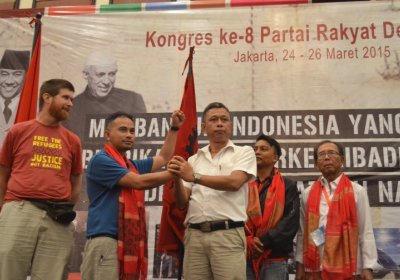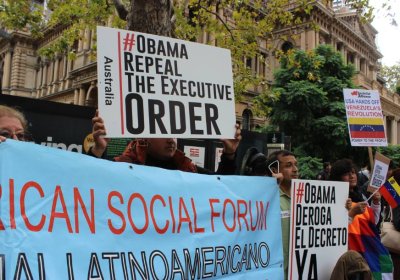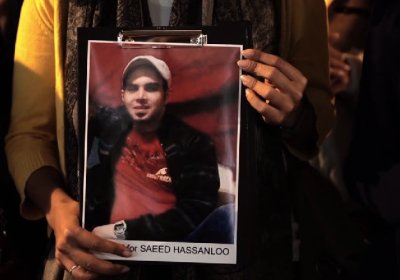The left-wing People's Democratic Party (PRD) held its eighth congress in Jakarta from March 24-26. This was the first time its congress was held openly.
The open congress marks an important new stage of development for the party, which has a history of underground organising dating back to the era of the Suharto dictatorship that was overthrown in 1998.
1048
 A lot is at stake in Turkey’s parliamentary elections to be held on June 7 — for the ruling Justice and Development Party (AKP) as well as the oppressed Kurdish population.
The AKP, led by President Recep Tayyip Erdogan, won 49% of the vote in the 2011 elections and holds 312 of the 550 seats in Turkey’s Grand National Assembly. A Gezici poll taken in January suggests the AKP’s support has slipped 9.7% to just under 40%.
A lot is at stake in Turkey’s parliamentary elections to be held on June 7 — for the ruling Justice and Development Party (AKP) as well as the oppressed Kurdish population.
The AKP, led by President Recep Tayyip Erdogan, won 49% of the vote in the 2011 elections and holds 312 of the 550 seats in Turkey’s Grand National Assembly. A Gezici poll taken in January suggests the AKP’s support has slipped 9.7% to just under 40%.
A new group has been established to campaign for women’s rights in Indonesia. In December, more than 100 women met in Jakarta to launch Indonesian Women’s Action – Kartini (API-K), which has begun campaigning for women’s rights in the workplace, home and society.
Participants came from 32 cities across Indonesia. They included women who are involved in existing women’s networks, students, workers and urban poor. They spent three days discussing issues facing women in economics, politics and culture.
Jay Famiglietti, a senior water scientist at the NASA Jet Propulsion Laboratory in California, made a dire warning in March: there is only one year's worth of water left in the state's reservoir storage and river basins.
Famiglietti said even nature's oldest water backup supply —groundwater — could be gone soon after the reservoirs dry up.
About 38.8 million people live in California, which produces much of the United States' food. California's drought is throwing the ecology of the region into crisis, and ordinary people are scrambling for ways to help.
The Inconvenient Genocide: Who Remembers the Armenians?
Geoffrey Robertson QC, Vintage Books,
Sydney, 294 pages, 2014
On the eve of Nazi Germany’s 1939 invasion of Poland, Adolf Hitler urged his generals “to kill without mercy men, women and children of the Polish race or language”.
“Only in such a way will we win [what] we need,” Hitler said. “Who, after all, speaks today of the annihilation of the Armenians.”
The Nazi leader was referring to the genocide carried out by the Ottoman Turkish empire in 1915 against the Armenian people within its borders.
US President Barack Obama admitted on April 9 that Venezuela “does not pose a threat” to the United States.
“We do not believe that Venezuela poses a threat to the United States, nor does the United States threaten the Venezuelan government,” Obama said during an interview with EFE.
Last month, Obama signed an executive order declaring Venezuela an “unusual and extraordinary threat to the national security and foreign policy of the United States.”
Venezuelan President Nicolas Maduro, along with his Bolivian counterpart Evo Morales, received a petition with 10 million signatures against U.S. President Barack Obama's executive order labelling the country as a “security treat” on April 9.
After the decree was issued, Maduro launched a campaign seeking 10 million signatures from Venezuelans demanding the decree be repealed, saying he would present them to the U.S. President Barack Obama at the April 10-11 Summit of the Americas in Panama.
About 150 people filled the St Kilda Town Hall on April 7 for a public meeting with visiting Israeli journalist, Amira Hass. Hass is a veteran Israeli columnist and reporter, lives in the West Bank among Palestinians and works for Israeli newspaper Haaretz.
The Australian Jewish Democratic Society organised the forum.
Moreland city council in Melbourne unanimously passed a motion opposing the closure of remote Aboriginal communities by the Western Australian government.
The council will write to federal Minister for Indigenous Affairs Nigel Scullion, WA Premier Colin Barnett and local federal ministers and Victorian senators in protest. It will also send a letter of solidarity to the Aboriginal communities under threat of forced closure.
Within two months of the cliff-hanger election that resulted in the ALP forming a minority government, what seems like a re-run of the attempts to unseat the Julia Gillard government in Canberra is playing out in Queensland.
Despite pressure from the Labor and Liberal parties to resign his seat, in a statement issued on April 8, the former ALP, now independent, MP for Cook, Billy Gordon confirmed that he will not resign from parliament but will continue to represent his constituents.
This statement was released by Billy Gordon on April 8.
***
Last week I resigned from the Australian Labor Party. I will not resign from parliament.
My decision is based on advice from the clerk of parliament, who gave detailed reasons why I did not have to resign over past events and allegations. I am also determined to honour my commitments to my constituents.
During the election campaign I committed to tackling entrenched social and economic problems in Cook and helping communities seize economic development opportunities.
Twenty-five-year-old Iranian asylum seeker Saeed Hanssanloo was reportedly improving with medical assistance after ending his hunger strike on April 7. Hanssanloo began refusing food more than 40 days previously when he learnt his asylum claim had been rejected.
- Previous page
- Page 2
- Next page










